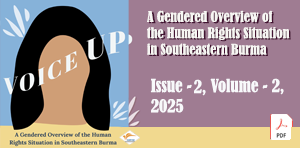Armed Conflict is Destroying Yebyu Township
September 29, 2025
For nearly three decades, HURFOM has worked alongside communities in Mon State, Karen State, and the Tanintharyi Region to document the violations that define their daily lives. Our role has always been to bear witness and ensure that the voices of those silenced on the ground are not lost. Each month, our field networks risk their safety to record the reality of civilians living under junta rule. What they find is devastating but necessary to tell: in September 2025 alone, more than 30 new cases of human rights violations were documented across 14 townships. These figures are not just statistics, they reveal the worsening crisis as communities are battered by airstrikes, artillery fire, arbitrary arrests, and the slow erosion of their most basic rights. Among the hardest-hit areas is Yebyu Township, where entire villages have been emptied as people flee junta offensives.
Since early July 2025, the military has launched indiscriminate artillery attacks on Ma Yan Chaung and Kaw Hline villages in Yebyu Township, claiming that Mon and Karen revolutionary forces are active in the area. By mid-August, heavy clashes had broken out, and from August 17 to September 10, junta regiments engaged in near-constant fighting with resistance forces.
The consequences for civilians have been catastrophic. Tens of thousands of residents from at least ten villages, including Kaw Hline, Thar Yar Mon, Ma Yan Chaung, 60-Mile, Yar Phu, Pha Yar Tone Zu, Kywel Tha Lin, Log Tie, and Kyauk Ka Din, have been forced to flee their homes. Families left behind everything they owned as fighting intensified, knowing that staying could cost them their lives.
The junta has also escalated arbitrary arrests. On August 24, soldiers detained 20 villagers, including a monk, in Thar Yar Mon. Four days later, another 25 people were arrested. Then, on September 8, eight villagers from Yar Phu were seized, followed by three more from Kywel Tha Lin the next day. Many remain unaccounted for, and relatives fear they will be tortured or used as human shields.
Tragically, civilians continue to pay the highest price. During this period, at least four people, including two children, were killed by junta artillery shells and landmines. Ten others were seriously injured. Schools across Kywel Tha Lin, Ma Yan Chaung, Thar Yar Mon, Ye Bu Yaw Thit, Yar Phu, Ywell Tie, Kyauk Ka Din, Ah Lell Sa Khan, Pha Yar Tone Zu, and Sein Bone villages have been forced to shut down, depriving hundreds of children of their right to education.
“Most children can’t go to school. If the situation becomes stable, every student will go back home and join the schools. But the clashes are still happening at the moment. No one dares to go home,” explained a parent from Yebyu Township.
The conflict has also created a humanitarian crisis. With roads blocked and transportation routes cut off, food and basic goods are scarce. Prices for essential items have skyrocketed, placing unbearable pressure on displaced villagers and those still trapped in conflict zones.
The scale of violence in Yebyu Township illustrates the junta’s deliberate strategy of targeting civilians to weaken resistance forces. By displacing entire communities, arresting villagers en masse, and sowing fear through artillery and landmines, the military is attempting to crush local resilience. Yet despite the immense suffering, communities continue to hold on to hope. They organize displacement routes, share scarce food, and support each other through immense hardships, signs of solidarity that the junta has failed to destroy.
HURFOM calls for urgent international attention to the plight of civilians in Yebyu Township and across the Tanintharyi Region. These communities are not just collateral damage; they are the heart of Burma’s struggle for dignity and survival. Their voices must be heard, their suffering recognized, and their rights defended.



















































